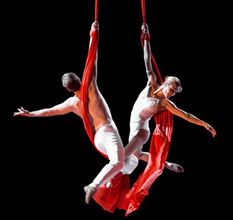‘Tis springtime, and music’s in the air as the season winds down. It’s the time for choral programs in great profusion – see our calendar for enough to satiate even the most die-hard fans of the genre. Even jaded critics are hard-pressed to resist – and why should they? The human voice, after all, was the very first and still most original instrument of them all (HIP practitioners, please note!).
The Triangle has outstanding choral resources, as readers of our calendar or visitors to the website of TriangleSings! (at http://trianglesings.org/ ) surely know without being told. There are large choirs and small ones, adult choirs and children’s choirs, professional choirs and amateur choirs, and a batch of specialty choirs celebrating diverse interests and persuasions. CVNC has covered a number of these of late, and there’s more in the offing.
Over in Chapel Hill on May 9, in the sanctuary of University United Methodist Church, one of our “specialty” choirs gave its spring concert, titled “American Quilt.” The group, Women’s Voices Chorus, has been led for a decade by its founder, Mary Lycan. Its 45 members include singers of solo quality that are often featured in WVC programs. The group’s performances are distinguished by all the hallmarks of outstanding choirs led by the finest directors in American choral history – superb diction, true intonation, excellent balance and blend, and great overall musicianship. But what sets WVC apart from most of our other regional choirs is its repertoire. The program under review – the contents of which were modified slightly after press releases were sent out and after the program was printed, too – serves to illustrate this admirably. The intermission-less, nearly all-American concert (the closing work was by a Canadian) encompassed sixteen numbers plus a sing-along and two solo piano works. The composers (or arrangers) of half of them were women. We’ll wager passes to WVC’s next season that no one in attendance (aside from the musicians and perhaps their families) had previously heard all of the music presented.
The first part of the lineup encompassed a tune by William Billings; three Shaker songs arranged by Nina Gilbert, one of which departed from expectations, for it was, in effect, a love-song, celebrating dancing, that stemmed from a nominally celibate religious community(!); a second dancing song (“Dancing”) by Scott A. Tucker; an exceptionally beautiful setting of words by Hildegard, composed by Naomi Stephan; a stately piece by Elizabeth J. Atkinson, of Virginia Beach, that used part of a prayer by Mother Teresa; and a spiritual arranged by Vermonter Gwyneth Walker, who happens to have been one of Lycan’s classmates at Brown University.
The sing-along was “America the Beautiful” (with words by a woman), for which Lycan composed a lovely descant, sung by the choir. Adaptations for solo piano of two Stephen Foster songs by Elinor Remick Warren were described in the extensive program booklet (sixteen pages, with complete texts, notes by Lycan, etc.) as “concert transcriptions” and were surely that; WVC accompanist Deborah Coclanis played them brilliantly.
The second half began with Amy Beach’s celebrated “The Rose of Avontown,” a piece more talked about than heard; it is arguably her best work, and the performance did it complete justice. A pair of madrigals by Roger Bourland ensued, followed by a snazzy blues number in canon form by Henry Brant, an arrangement of “Shenandoah” by Lycan’s other half (present for the concert but not recognized by the director(!)), Copland’s “I Bought Me a Cat” (with two minor textual emendations), and a grand version of “The Erie Canal,” arranged by Clifton J. Noble, Jr. The concert ended with the song that gave the program its theme, “The Quilt,” by Donna Rhodenizer, of Kentville, Nova Scotia. The quilt theme was woven throughout the program notes and could hardly have been missed by the attendees: there were quilt patterns on the program booklet’s cover, and quilts made by members of the choir were draped over the communion railings. (They will be donated to sick children at UNC Hospital.)
We’ve carried on at great length here, citing most of the works given, because the program was so unusual – and so compelling. The performances were richly varied, too; most were given by the entire chorus, and many were a cappella (facilitating greater appreciation of the singing). A smaller group of twenty singers, dubbed “The Spring Ensemble,” performed Stephan’s fascinating “O virtus Sapientie,” in which guest soprano Anna Kirby was featured, along with Andrew Hummer, vibraphone, and Kathryn Pruitt, marimba. Kirby also appeared during part two, in Beach’s grand work. The other soloists, from the choir, were Marilyn Grubbs, Ruth Winecker, Marsha Green, and Amy Sinderman (listed in order of appearance).
What made this program so memorable were the works given and the performances themselves, which compared favorably with our state’s most celebrated ensembles. WVC has debuted a new website, at http://www.womensvoiceschorus.org/ ; visit it for more information. Next season’s concerts, which are sure to encompass still more “new” and “unusual” music, are planned for February 1 and May 7, 2004.
WVC’s “low impact” Summer Chorus is seeking singers for a musicale on July 22; and last but hardly least, Lycan is launching a small group, the Isabella Women’s Solo Ensemble, in October. See “Performance opportunities/auditions” in our main calendar for details.
[Edited & corrected 5/12/03 p.m.]











